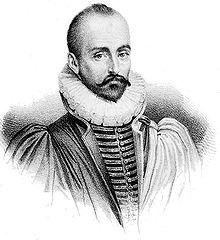
Michel de Montaigne, Wikimedia Commons
Montaigne's Essays
Michel de Montaigne, a French wise man who lived from 1533 to1592, has written a work named “Essays” in which he collects thoughts he has worked with throughout his life. These thoughts are as valid today as they were then, and I wish to share in brief form those that I have noted when reading his work. His work is made up of three books, and I have separated my notes in three corresponding links, as follows: Book I, Book II, and Book III. My notes are presented in the order I have noted them. As I proceed with my reading, I will add more of his thoughts.